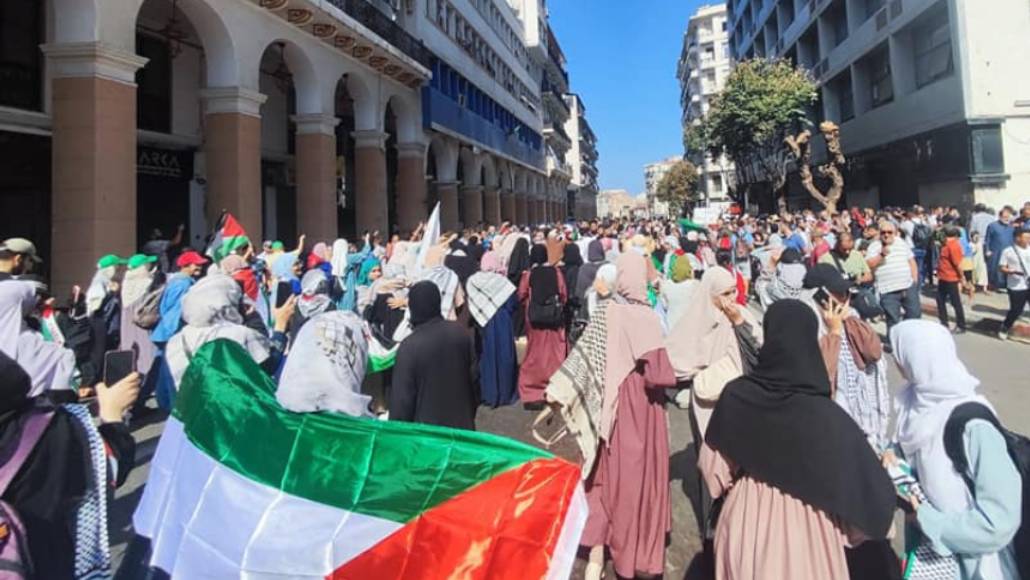Entrevistamos al compañero Farid Ziane, activista socialista en Argelia, sobre el conflicto palestino-israelí y los sentimientos del pueblo argelino hoy. Pese a la prohibición del gobierno, una concentración pro-palestina tuvo lugar el viernes 13 en Alger, la capital.
¿Cómo se viven los acontecimientos de Gaza en Argelia?
Tal vez sea útil recordar que en Argelia, y en particular en los sectores populares, existe una fuerte simpatía por la cuestión palestina vista como una causa anticolonial legítima, del mismo modo que la legitimidad de la lucha en Argelia contra el colonialismo francés. Por eso las banderas palestinas están siempre presentes en diversas manifestaciones en Argelia contra el gobierno o en las gradas de los estadios durante los partidos de fútbol.
Volviendo a la noticia, la ofensiva de Hamás, por su escala y eficacia, sorprendió a más de uno. También sorprendió porque las masas observaron que al alineamiento sistemático del imperialismo con las posiciones de Israel se sumaba el de los Estados árabes normalizadores, lo que hizo decir a varios observadores que la cuestión palestina queda definitivamente relegada en segundo plano. Y ahí vemos que este rotundo regreso de la cuestión palestina al primer plano, eclipsando incluso la cuestión ucraniana, ha contradicho contundentemente estos análisis pesimistas.
Al mismo tiempo, la ofensiva de Hamás fue acogida con entusiasmo y alegría, pensando en las represalias de Israel que, como es habitual, provocarían miles de muertos y heridos civiles a consecuencia de los bombardeos. De hecho, esto es lo que estamos presenciando. Netanyahu creó un “gobierno de guerra” cuya misión sería la aniquilación de la resistencia palestina. Este consenso colonial dentro de la sociedad israelí es peligroso y pone en dificultades las vías pacifistas o antisionistas israelíes. De ahí la necesidad de intensificar las campañas de solidaridad internacional.
¿Existen iniciativas de apoyo a los palestinos?
Palestina siempre ha sido un factor de politización y movilización en Argelia. Por ejemplo, en enero de 2009, en un contexto marcado por la prohibición de manifestaciones en Argel, ital, fue en torno a la solidaridad con Palestina, entonces sometida a los bombardeos israelíes, que se creó un equilibrio de poder que impuso el derecho a manifestarse. en Argel. Anteriormente hubo dos intentos de movilización iniciados por nuestro colectivo en la Universidad de Bouzareah, en las alturas de Argel, que fueron impedidos por importantes medidas de seguridad.
Ahora hay mucha discusión sobre lo que está sucediendo allí, la traición de los países árabes, el alineamiento total de las potencias occidentales con la narrativa sionista. La indignación es demasiado fuerte y finalmente desembocó en una concentración, a pesar del clima autoritario que reina en Argelia. El derecho a manifestarse en apoyo de Palestina no está completamente logrado a pesar del apoyo oficial de Argelia a esta causa y su negativa a normalizar sus relaciones con el Estado colonial.
¿Cuál cree que es el resultado de este conflicto histórico?
Actualmente es difícil ver el final del túnel ya que la situación se ha complicado aún más. La solución de dos Estados adoptada al final de los Acuerdos de Oslo ya está obsoleta, la continuación de los asentamientos en Cisjordania y el bloqueo de Gaza han reducido a la nada la superficie de Palestina, sin continuidad territorial. De esta situación podrida nacieron y crecieron organizaciones reaccionarias como Hamás, que se beneficiaron en gran medida del descrédito de la Autoridad Palestina, que se había convertido en colaboradora de Israel. Pero los islamistas de Hamás también han decepcionado en la prueba de poder, una decepción que sólo puede acentuarse después de la normalización de varios países árabes a los que están asociadas las ramas locales de los Hermanos Musulmanes como el Partido de la Justicia y el Desarrollo (PJD). en Marruecos. Esto significa que la llama de la resistencia se mantiene intacta entre la población palestina que le da la espalda a sus autoproclamados representantes políticos.
Pero un nuevo liderazgo político tarda en emerger, el colonialismo israelí tiene cuidado de cortar las cabezas a cualquier nueva figura que emerge y Marwan Barghouti, figura principal de la segunda intifada, todavía languidece en prisión. Pero siempre confiamos en la capacidad de los colonizados de levantar la cabeza, de inventar sus nuevos instrumentos de lucha y de combate contra el colonialismo. La cuestión nacional es legítima, sólo podemos apoyarla con la esperanza de que se resuelva bajo la bandera del socialismo y la hermandad de los pueblos. A condición de que exista un liderazgo político del lado palestino que le tienda la mano a un movimiento obrero israelí capaz de deshacerse de su mentalidad colonial. El camino es duro pero no hay atajos.
Entrevista: Pablo Vasco




